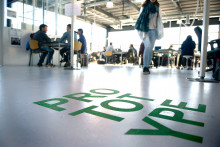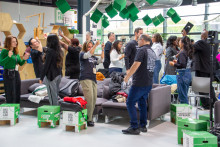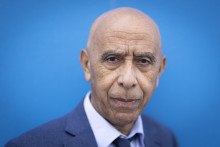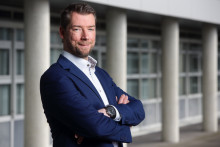Project STAR/T is intended for refugees in the Netherlands, who wish to start their own business. It consists of a six weeks program that guides the participants through the process of turning an idea into a viable enterprise.
‘We have been trying to get the program off the ground for a long time and we are happy to say that the first edition began several weeks ago,’ explains UT researcher Juan Jauregui Becker, who was one of the main initiators of this Living Smart Campus project. Together with his UT colleagues – Laura Franco Garcia (CSTM), Aard Groen and Jaap van Tilburg (both NIKOS) – Becker helped to design the program, acquire funding and recruit the participants. The first attendants are currently in the DesignLab, working on their business plans with the help of UT students and trainers from a startup school Delitelabs and a startup studio Mindt.
‘They have to start all over’
The UT is now hosting about twenty refugees, mainly from Syria, Afghanistan and Iraq, all of whom hope to start their own company here in the Netherlands. ‘Many of our participants were already successful entrepreneurs back in their home country. But they have to start all over here, learn the language and the market,’ says one of the program trainers Ludovica Marini from the startup Mindt, which has contributed to the program alongside the UT.
Divided into groups, the participants are working on a variety of business ideas. One group aims to open a shop with Middle Eastern products, while another one wishes to start a restaurant with Arabic specialties. ‘I worked as a manager of a restaurant near Damascus for many years,’ says Basem Najmeh, one of the participating refugees. ‘We want to open up a new restaurant here in Overijssel to also help others find work.’

Better integration
As Ludovica Marini points out, many of the business ideas are focused on bringing the refugees’ culture here and on working towards better integration. The idea of Al Moatasem Bellah is no exception. ‘I’d like to provide a service that supports people who don’t speak Dutch in obtaining their driver’s license,’ says the hopeful entrepreneur from Syria, who will concentrate on Arabic speakers at first. ‘I’d like to not only provide study materials, but also come up with a completely new way of teaching.’
And what does Al Moatasem think of the STAR/T program so far? ‘I’ve always been passionate about having my own business and this is a good first step. It helps me get to know the market and it gave me new friends and a good network.’
Next phase
This week of the program is dedicated to creating prototypes. Next week the participants will pitch their final ideas to a panel of experts. Based on these presentations, some of the refugees will continue to the next phase of the program, which will likely start in January 2018. ‘The next phase will also be done in close cooperation with the UT,’ points out Jauregui Becker and adds that the university will provide weekly workshops for the participants. Besides that, the UT is involved in research of the STAR/T project with the hopes of further improving this new program.
If you would like to support the program participants, you are welcome to join them tomorrow, the 8th of November, anytime between 9 a.m. and 2 p.m. in the DesignLab and provide them with feedback on their ideas.







